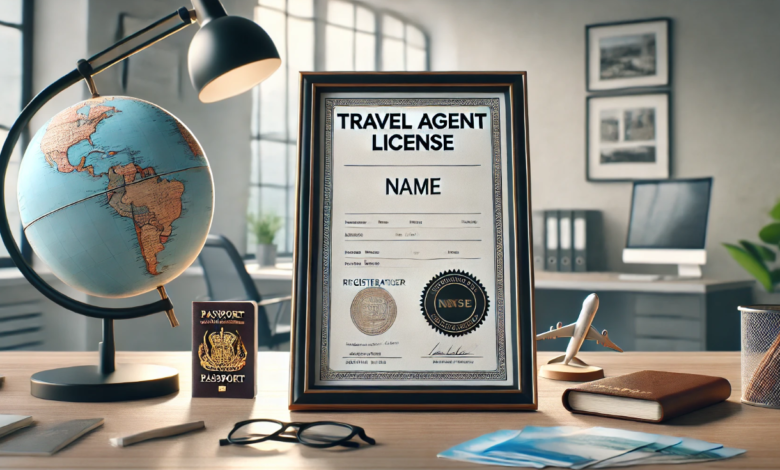
Are you passionate about travel and eager to turn your love for exploring the world into a career? Becoming a licensed travel agent is a great way to enter the exciting tourism industry. A travel agent license not only adds credibility to your services but also opens doors to working with established suppliers, gaining access to exclusive deals, and building a successful career.
In this guide, we’ll break down what a travel agent license is, why it’s important, and how to obtain one. Let’s explore the steps to becoming a professional travel agent!
What Is a Travel Agent License?
A travel agent license is a certification or permit that allows individuals or businesses to legally operate as travel agents. In many jurisdictions, this license is required to sell travel services, book accommodations, or act as an intermediary between clients and travel providers.
The licensing process varies by country and state, with some requiring specific education, exams, or registration fees.
Why Is a Travel Agent License Important?
1. Credibility and Trust
A license assures clients that you operate legally and ethically. It shows that you’re committed to professionalism and quality service.
2. Access to Supplier Networks
Many airlines, hotels, and tour operators only work with licensed travel agents. A license can give you access to exclusive deals and partnerships.
3. Legal Protection
Operating without a license in regions where it’s mandatory can lead to fines or legal action. Having a license ensures compliance with local regulations.
4. Business Growth
Being licensed allows you to market your services more effectively, attract more clients, and expand your business.
Do You Need a Travel Agent License in Your Location?
1. United States
In the U.S., licensing requirements depend on the state. States like California, Florida, and Hawaii require travel agents to register and obtain a seller of travel license. In other states, no specific license is needed, but joining a travel host agency or obtaining certifications like the Travel Institute’s TAP test is highly recommended.
2. Canada
In Canada, certain provinces like Ontario and British Columbia require travel agents to register with regulatory bodies like TICO (Travel Industry Council of Ontario).
3. United Kingdom
In the UK, travel agents must follow the rules set by ATOL (Air Travel Organiser’s License) and the Package Travel Regulations to ensure consumer protection.
4. Other Regions
Many countries require travel agents to register with a tourism authority or regulatory body. Always check local regulations to ensure compliance.
Steps to Obtain a Travel Agent License
1. Research Licensing Requirements
Start by identifying the specific requirements for your location. Visit government websites or consult with local tourism boards for accurate information.
2. Complete Relevant Education
Some regions may require you to complete travel-related courses or certifications. Even if it’s not mandatory, education can boost your credibility and knowledge.
Recommended certifications include:
- Certified Travel Associate (CTA)
- Certified Travel Counselor (CTC)
- Travel Institute’s TAP (Travel Agent Proficiency) Test
3. Register Your Business
If you plan to operate independently, register your travel agency with the appropriate local authorities. You’ll need to choose a business structure (e.g., sole proprietorship, LLC) and obtain a tax identification number.
4. Obtain Insurance
Travel agents are often required to carry errors and omissions (E&O) insurance, which protects against claims related to professional mistakes.
5. Apply for the License
Submit the required application forms, documents, and fees to the relevant licensing authority. This may include proof of education, business registration, and insurance.
How Much Does It Cost to Get a Travel Agent License?
The cost of obtaining a travel agent license varies widely depending on your location and business model.
- State Fees: Licensing fees in the U.S. range from $50 to $500.
- Education Costs: Certification programs can cost anywhere from $200 to $1,000.
- Insurance Premiums: E&O insurance typically costs between $250 and $500 annually.
While these costs may seem significant, they are an investment in your career and business growth.
Benefits of Becoming a Licensed Travel Agent
1. Increased Earning Potential
Licensed agents have access to commission-based income through partnerships with airlines, hotels, and tour companies.
2. Networking Opportunities
Being licensed allows you to join industry associations like ASTA (American Society of Travel Advisors) or CLIA (Cruise Lines International Association), connecting you with industry leaders.
3. Travel Perks and Discounts
Licensed agents often enjoy discounted travel rates, including flights, accommodations, and tours, as part of industry incentives.
4. Client Confidence
A license reassures clients that they are working with a legitimate, knowledgeable professional.
Challenges in Obtaining a Travel Agent License
While the rewards are significant, obtaining a license can come with challenges:
- Navigating Regulations: Licensing requirements can be complex and vary by region.
- Financial Investment: Initial costs for education, licensing, and insurance may seem high.
- Staying Updated: Licensing rules and industry standards evolve, requiring ongoing education and compliance.
Despite these challenges, the benefits far outweigh the difficulties for those committed to building a successful career in travel.
Alternatives to Licensing
If licensing isn’t required in your area, consider joining a host agency. These agencies provide resources, training, and connections to suppliers, allowing you to operate under their credentials. Popular host agencies include:
- Avoya Travel
- Travel Planners International
- Nexion Travel Group
Frequently Asked Questions (FAQs)
1. Do all travel agents need a license?
Not always. Licensing requirements vary by location. Some areas require a license, while others may not, but certifications are often recommended.
2. Can I work as a travel agent from home?
Yes! Many travel agents operate remotely, especially when affiliated with a host agency.
3. What skills do I need to be a successful travel agent?
Strong communication, organizational skills, and knowledge of travel destinations are essential. Marketing and customer service expertise are also valuable.
4. Is being a travel agent profitable?
Yes, with proper licensing and partnerships, travel agents can earn a good income through commissions and repeat clients.
5. How long does it take to get a travel agent license?
The timeline varies, but most licensing processes can be completed within a few weeks to a few months.
Conclusion
Obtaining a travel agent license is a vital step for anyone looking to build a successful career in the tourism industry. It ensures credibility, provides access to valuable resources, and sets the foundation for long-term success. By following the steps outlined in this guide, you can confidently embark on your journey as a licensed travel agent and help clients create unforgettable travel experiences.
Whether you’re passionate about planning luxury vacations or budget-friendly adventures, becoming a licensed travel agent opens up a world of opportunities. Start your journey today and turn your love for travel into a rewarding career!


